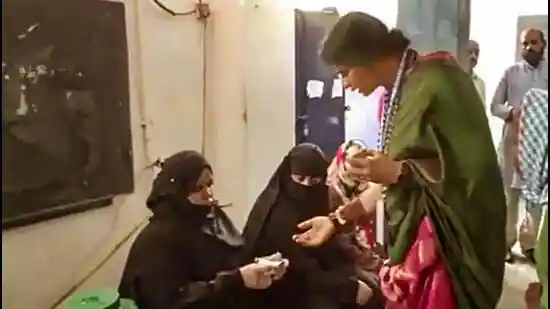In a video during the fourth phase of voting, Madhavi Latha can be seen asking women to remove their burqas on the orders of the election officer. A case has been filed against Lata. Does covering the face not affect transparent voting? Know what are the rules on this in our country and other countries.

BJP candidate Madhavi asked women to remove their burqas so that she could match their faces with photo IDs. Madhavi Latha was accused of misbehaving with Muslim women voters. She was booked under section 171 C of IPC for influencing elections. A case was registered under 186 and 501 C for stopping a public servant and also a case was registered under 132 of the Representation of the People Act. While giving clarification, the BJP candidate said that according to the law, to make sure that no fake vote is cast, if necessary, the polling officer has the right to take the photo of the voter card and the name of the voter.
The issue of masks has been talked about for a long time. Although it is common for women of a particular religion to cover their faces, before the first Lok Sabha elections in the 50s, the Election Commission had tried its best to ensure that women participate in the elections, but many women refused to register their names as voters. They wanted to be known by the name of their relatives like mother, sister, or wife of a certain person.
In order to protect the privacy of voters as well as to ensure fair elections, the EC has given instructions to the concerned officials. According to this, if a large number of veiled women are found at a polling station, officials should make special arrangements for their identification. Under this, a female polling officer should be appointed in a separate room so that confidentiality and decency are maintained. The rule says that wherever a woman voter is coming with her face covered, there must be at least one woman polling officer.
Also, there are restrictions in foreign countries regarding masks or face covers during voting. There is a rule in other countries that the voter will have to remove the cover or mask from the face, even if only for a short while. The complete process is explained on the official website of the Electoral Commission of Britain.
You can read it here – Checking your photo ID if you wear a face covering
If a woman voter wants, she can request facial matching in private. The request has to be made to the Returning Officer. Usually, this request is accepted. After the ID check, the female voter can do the rest of the voting process by wearing a burqa or niqab. For this, a mirror is also available at the polling station.
But there are many countries where face covering is banned. Women cannot wear a burqa or niqab in public places. This rule is for safety reasons. About 12 years ago, France made this rule, becoming the first country to do so. Under the ban, no woman can go out of the house with her face covered. For breaking the rule, a fine has to be paid. Also, in Belgium, Netherlands, Austria, and in some cities of Italy, there is a ban on covering the face. In Germany, women cannot cover their face while driving. In Norway, burqa or hijab is prohibited in schools and colleges. Also, in many countries of Muslim-majority Africa, burqa is still used.

